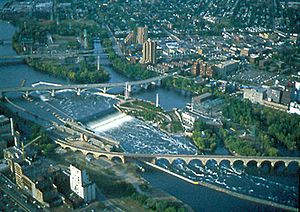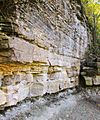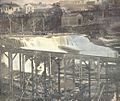Saint Anthony Falls facts for kids
Saint Anthony Falls was once a huge, natural waterfall on the Upper Mississippi River. It was the only big waterfall along this part of the river. You can find it northeast of downtown Minneapolis, Minnesota. People also called it the Falls of Saint Anthony. Sadly, the natural falls collapsed in 1869. After that, a man-made spillway was built in its place.
Contents
What Are Saint Anthony Falls?
Today, Saint Anthony Falls is not a natural waterfall anymore. It's a series of dams and locks that control the river's flow. These structures help boats travel up and down the Mississippi River. They also help manage the water for power and flood control. The area around the falls is very important to the history of Minneapolis.
Why Were the Falls Important?
The natural falls were very powerful. They provided energy for many early industries. Sawmills used the water power to cut wood. Flour mills used it to grind grain into flour. This made Minneapolis a major center for milling. The falls helped the city grow quickly in the 1800s.
The Collapse of 1869
In 1869, a big problem happened. The rock underneath the falls began to wear away. This caused a large part of the falls to collapse. It was a serious event for the city. Engineers had to work hard to stop more damage. They built a strong concrete "apron" over the falls. This apron helped protect the remaining rock. It also created a new, controlled waterfall.
How Locks and Dams Work
The locks and dams at Saint Anthony Falls help boats move past the drop in the river. A lock is like a water elevator for boats.
- A boat enters a chamber.
- Gates close behind it.
- Water is either added or removed from the chamber. This raises or lowers the boat to the new water level.
- The front gates open, and the boat can continue its journey.
There are both upper and lower locks at Saint Anthony Falls. These allow ships to travel through Minneapolis.
History of the Falls
Native American tribes, like the Dakota and Anishinaabe, considered the falls a sacred place. They called it "Owámniyomni," meaning "whirlpool." The first European to see the falls was Louis Hennepin in 1680. He named them after his patron saint, Saint Anthony of Padua.
Early Industry and Growth
As more settlers arrived, they saw the falls' potential. In the 1840s and 1850s, many sawmills were built. These mills processed timber from Minnesota's forests. Later, flour mills became very important. Companies like Pillsbury and General Mills started here. The power from the falls helped them become huge businesses.
Protecting the Falls Today
Today, the area around Saint Anthony Falls is a historic district. It's part of the Mississippi National River and Recreation Area. People can visit the Stone Arch Bridge for great views. They can also learn about the falls' history. The locks at Saint Anthony Falls were closed to commercial traffic in 2015. This was done to help protect the river's ecosystem.
Images for kids
-
The Falls of St. Anthony, a painting of St. Anthony by Albert Bierstadt
-
Mississippi River at Minneapolis in 2008, looking downstream. The bridge in the foreground is the Third Avenue Bridge, behind it are the Upper St Anthony Falls to the left and the upper lock and dam to the right, followed by the Stone Arch Bridge. The new I-35W Saint Anthony Falls Bridge can be seen in the background.
-
Mid 1850s Daguerreotype of St. Anthony Falls
-
In 1963 the Stone Arch Bridge was altered to allow clearance for the upper lock
See also
 In Spanish: Cataratas de San Antonio para niños
In Spanish: Cataratas de San Antonio para niños
 | Jackie Robinson |
 | Jack Johnson |
 | Althea Gibson |
 | Arthur Ashe |
 | Muhammad Ali |




















